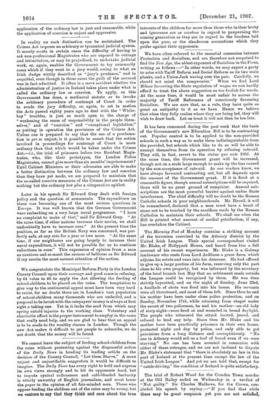In reality no such distinction can be maintained. The Crimes
Act imposes no arbitrary or tyrannical judicial system. It merely meets in certain cases the difficulty of having to ask non-professional Magistrates who are exposed to outrage and intimidation, or may be prejudiced, to undertake judicial work, or, again, enables the Government to try summarily cases which if they went to a jury would, owing to what an Irish Judge wittily described as " jury's prudence," end in aequittal, even though in those cases the guilt of the accused was in fact admitted. It often is a mere accident whether the administration of justice in Ireland takes place under what is called the ordinary law or coercion. To apply, as this Government has done, a mediaeval statute or to invoke the arbitrary procedure of contempt of Court in order to evade the jury difficulty, or, again, to set in motion the Acts passed eighty years ago to deal with the " White- boy" troubles, is just as much open to the charge of " weakening the sense of responsibility in the people them- selves," and of "coercion" and "exceptional legislation," as putting in operation the provisions of the Crimes Act. Unless one is prepared to say that the use of a proclama- tion is per se unjust, is it possible to assert that the action involved in proceedings for contempt of Court is more ordinary than that which would be taken under the Crimes Act,—i.e., the trial of prisoners before two Resident Magis- trates, who, like their prototypes, the London Police Magistrates, cannot give more than six months' imprisonment ? Until Cabinet Ministers or their advocates are able to make a better distinction between the ordinary law and coercion than they have yet made, we are prepared to maintain that the so-called coercive measures of the Crimes Act are in reality nothing but the ordinary law plus a vituperative epithet.














































 Previous page
Previous page